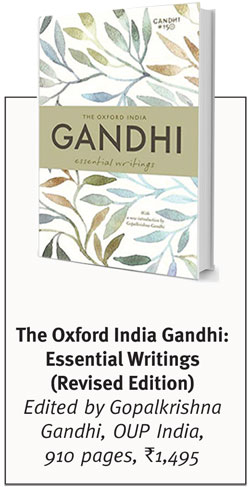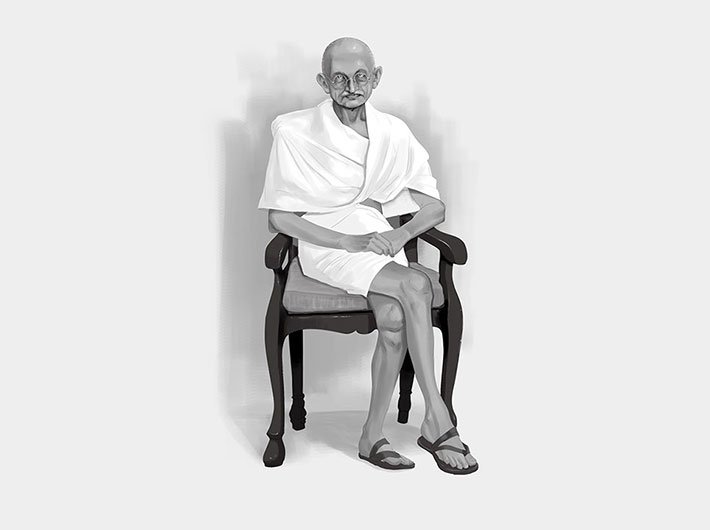The Mahatma’s message unfolds beautifully in this excellent selection of writings, republished for the sesquicentennial
For a novice reader, MK Gandhi presents a formidable challenge.

The starting point is usually the autobiography, with its well-known anecdotes which most of us are familiar through school textbooks and films. If anything, they are rather too familiar and some readers, looking for new material, get bored. It also ends in the late 1920s, and thus presents only a part of the life story. The next is Hind Swaraj: the ‘key text’, the manifesto, the guide for spiritual-political transformation inside out. What ne xt? Then there are about five more volumes which were originally intended as books – that is, not including countless anthologies others made from his writings. After the core, the scene opens up.
Many libraries have devoted whole sections, full of several bulging shelves, to Gandhiana. Indeed, there are full-fledged libraries devoted to nothing other than Gandhiana: for example, the one housed in the National Gandhi Museum across the Raj Ghat. At the heart of the collection is the Collected Works of Mahatma Gandhi (CWMG). Every word that Gandhi ever wrote in thousands of letters or in editorials of four journals he edited, every word he uttered in public speeches, countless interviews – all is put together in 97 volumes. With two volumes of indexes and one collecting prefaces, the total number rounds off at hundred. They all are published also in Gujarati and Hindi, completing the three languages he primarily used. In Gujarati, the series is called ‘Gandhiji-no Akshar Deh’ – Gandhi’s Body of Letters. ‘Akshar’ also means imperishable: here – sharing his experiences and experiments for our edification, articulating his evolving vision of self-rule, inviting us to join him on this journey of discovery – is the imperishable Gandhi.
This, then, is the challenge for a reader. No wonder most novice readers leave the rich treasure of CWMG untouched. Gopalkrishna Gandhi offers them hand-holding by making selections from the CWMG, among other sources, presenting it chronologically but also grouped thematically. Thus, this is Gandhi’s life and thought in his own words, in a single volume. It was published in 2007, and is being republished with a new introduction by the editor on the occasion of the Mahatma’s 150th birth anniversary.
This is not the first work to dip into the hundred volumes and bring for us the essence. Raghavan Iyer compiled two similar anthologies about two decades ago – The Essential Writings of Mahatma Gandhi and The Moral and Political Thought of Mahatma Gandhi. On the occasion of the Gandhi Sesquicentennial, Oxford University Press India has brought out their fresh editions too. Elsewhere, there is ‘The Essential Writings’, edited by Judith Brown and published in the incomparable Oxford World Classics series.
'The Oxford India Gandhi: Essential Writings', edited by Gopalkrishna Gandhi, offers a more comprehensive view of the unusual life. Viewed as a kind of life-story, this should become more preferable over numerous excellent biographies. “Repetition has made one of the world’s most compelling, challenging, transformational, and passionate persons the one thing he never was – boring. It has made that most original person clichéd. One of my aims in selecting passages from his works has been to redeem the living Gandhi from the plaster-cast image of the Mahatma,” writes the editor in the introduction.
The added advantage here is that the selections from the CWMG are complemented by those from “books with ‘Gandhi quotes’ written in his lifetime and the works such as those of Millie Graham Polak, Mahadev Desai, and Prabhudas Gandhi, which also appeared during his lifetime, as well as those of and his immediate associates like Pyarelal, Manu Gandhi, and Nirmal Kumar Bose, which were published after Gandhi was no more”.
The 150th anniversary is yet another occasion that should remind us of the significance of Gandhi’s life-work and the urgent need to explore alternatives. In a fresh introduction, Gopalkrishna Gandhi raises these questions again for a world more and more divided by greed and hatred, a world of climate crisis and walled boundaries.
“The prospect of war and the reality of terror float in the air everywhere, all the time. Like the deadly miasma of greenhouse gas emissions from the relentless combustion of fossil fuels which are likely, say experts, to cross historical values and take the earth beyond ‘a threshold of 2°C global warming’. A waiting disaster,” writes the editor.
“The Buddha’s Fire Sermon, on which T.S. Eliot has rested The Waste Land, is playing out right in front of us.
“It burns, said the Enlightened One. Everything burns.
“Hiroshima and Nagasaki know. Vietnam knows.
“Chernobyl knows, Fukushima knows.
“New York knows. Syria knows. The Rohingya know. All who are threatened and bullied by those bigger and stronger than them, know.
“Does Gandhi have anything for such a world?”
Yes: a “terror-struck, strife-torn, and self-obsessed world looks to Gandhi as it looks for a politically ethical future,” argues the editor.
There have been many other travellers to that land, but Gandhi remains the best guide on this journey and this majestic volume can be a significant step in that direction for the novice reader.
(This article appears in the February 28, 2019 edition)



